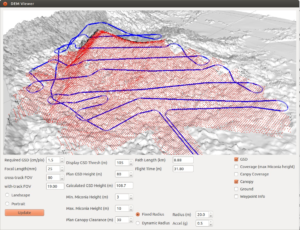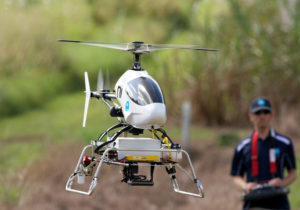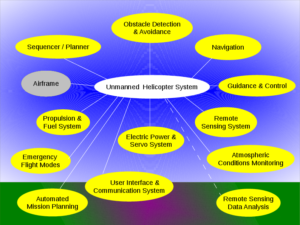Project ResQu
Project ResQu was a 2 year, $7M project co-funded through the Queensland State Government Smart Futures Fund, Boeing Research and Technology Australia, Insitu Pacific Ltd., CSIRO and ARCAA/QUT.
The Biosecurity Application stream lead by the CSIRO focused on the development of an unmanned aircraft system for performing Miconia weed surveys. In May 2014, two Project ResQu helicopters developed by CSIRO completed trial flights near Cairns, locating weeds like the dreaded ‘purple plague’, or Miconia calvescens, faster and more reliably than ever.
Developed by robotics researchers at CSIRO, in partnership with Biosecurity Queensland, the unmanned helicopters found weeds using sophisticated imaging technology. The helicopters are safer and a more convenient way of mapping weeds in remote and difficult terrain. In October 2015, an improved version of the helicopter with the CSIRO designation SMR-1 was successfully tested in another Miconia survey near Cairns conducting more than 6 hours of flight without pilot intervention.

mapping of a hill from the unmanned helocpter
mapping of a hill from the unmanned helocpter

Helicopter drone
- wide-view angle high-resolution image capture and accurate geo-referencing
- flight planning software for capturing images of mountainous terrain with defined maximum ground sample distance (GSD)
- image visualisation software allowing efficient analysis of thousands of images captured during one flight
- 3D curved-trajectory flight (2014)
- radar-based avoidance of static bstacles and terrain following (2013)
- research challenges:
- safe autonomous low-altitude flight in mountainous terrain at performance and endurance limits of aircraft
- dependable cost-effective solution meeting mission objectives including camera system optimised for environment and aircraft
- ca. 9 hours of low-altitude flight in mountainous terrain without pilot intervention
- media release: CSIRO link
- overall project description: ARCAA external linksystem components:

System components of Unmanned helicopters
System components of Unmanned helicopters
Links
- CSIRO – Robots to the ResQu.
- ARCAA – Project ResQu
